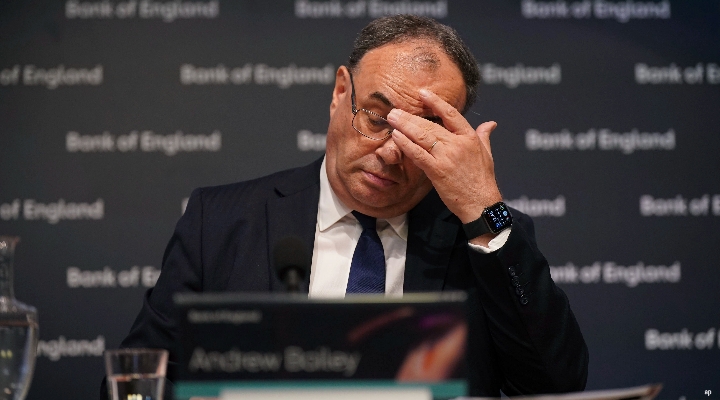
Whoever wins the leadership election faces a colossal pile of problems, policy decisions and ministerial challenges both within and without government. We’ve gone through each department compiling them, tracking overlaps in agendas, policy deadlocks, limitations and legal loggerheads.
The Home Office
Starting at home, Britain’s interior department faces PR crises on two fronts: crime and immigration. On the first, in the short-term the cost of living crisis threatens civil unrest and spikes in crime as people struggle to survive price hikes and energy gouging, while, in the longer-term, under-resourced local forces face the gargantuan task of policing a nation at war (verbally, at least) over appropriate uses of its cops' time. Yes, that’s a reference to bureaucracy, petty misdemeanors and the question of offence. And at the heart of it all, a flagship force riven with accusations of corruption and abuses of power. The Metropolitan Police is under fire, but its own problems are echoed throughout smaller forces. Another issue for the Home Office is the Rwanda deportation plan, which started this summer. At the moment, it seems very unlikely the idea will end well.
The Treasury
Controlling all our public sector cash and setting the fiscal tone in Whitehall is Britain’s powerful Treasury. Ever present in the political mix is how much control the chancellor of the exchequer yields. After the bust-up between Boris Johnson and Sajid Javid that led the latter to quit shortly before the UK entered its biggest-ever modern peacetime crisis, the leadership winner will have to balance their desire to impose authority on the Treasury with the need to delegate. There's talk of a landgrab among the PM candidates PM too, meaning No 10 wants to seize some of the economic levers from No 11 Downing Street. Oh, and that’s just the start. The tax system is widely considered to be riddled with dysfunctional incentives, crucial public services like the NHS are on their knees, and the political hot potato of austerity is certainly still more than warm. Difficult decisions lie ahead, and the Bank of England’s future may be the first on the list.
The Foreign, Commonwealth and Development Office
As foreign secretary, Liz Truss managed to avoid the gaffe-tastic track record that defined Boris Johnson’s time at the UK’s third great department of state. But at such a crucial time for international relations, that doesn’t look like too much of an achievement. Forced into a strategy of bilateral partnerships by Brexit, the UK often looks isolated on the world stage, its performance during moments of crisis a shadow of what it once seemed capable of (look up Operation Pitting). Talking detail, though, the three big countries civil servants will be worrying about are Russia, China, and Taiwan. With all of them, we are dependent on the US for clout. If the muck really hits the air conditioning unit, we are unlikely to have the strength in numbers to make a meaninfgul contribution. See more below.

The Ministry of Defence
In a year that’s brought war to the fringes of the NATO area of influence, it doesn’t bode well that the Ministry of Defence faces a funding black hole, dwindling service personnel numbers, ammunition supply woes (the UK has been very generous in handing next-gen anti-tank weapons, armoured fighting vehicles and helmets to the Ukrainians), and extremely concerning questions over the quality of its rolling materiel stock. At the heart of that is the internationally embarrassing story of AJAX, the much-vaunted replacement to the British Army’s Warrior infantry fighting vehicle, now nearly 40 years old. Widely considered to be a multi-million-pound disaster, this particular equipment programme seems to be the very worst of what can go wrong with contract tendering. The Navy and Royal Air Force can only look on in horror, and neither is without problems either. Nuclear spending and security in the first case, and a fast jet pilot training crisis in the second, will be enough to make any aspiring defence secretary weep.
The Department For Transport
Thrust back into the limelight amid train strikes and a long hot summer of rail network disruption, the Department For Transport is the UK government department widely regarded as boring but utterly crucial to UK PLC's success. Not even Grant Schapps’ idea of cutting down on train announcements will scratch the surface of this department’s in-tray. Will the UK’s transport infrastructure cope with longer-term climate change-related heat increases? Will funding formulas continue to show the very worst of privatisation initiatives? Will Transport For London go under? And is it possible to adapt a system and simultaneously ensure one of the UK’s most dangerous occupational sectors remains a safe place to work for its staff and customers? Answers on the back of a fag packet, but no vaping in the vestibules please.
The Department For Education
As teachers abandon the profession in significant numbers, and more children turn up to school having not had breakfast, one could question whether DfE is really a department for education at all. At best it is a body beset with all the same questions of risk management as any of its public sector peers, and at worst it can often appear a department of pragmatically-but-poorly-executed social work. But alongside poverty and life chances, further threats make life at the department very difficult. A new prime minister will have to decide how it confronts the issue of curriculum content in the culture war era, while ensuring attainment doesn’t dip against international standards following Covid-19. At the moment the figures seem to suggest that, on the latter count, it is failing. We'll see you after class.
Business, Energy and Industrial Strategy
One of the departments most vulnerable to rebrands, the clunkily-abbreviated BEIS is spread thinly across several fronts. Britain will likely enter a recession on its watch, while the question of energy costs is forcing citizens into situations they thought unthinkable but 12 months ago. You can add to that the scary question of nuclear energy, recently ratified as a “sustainable” source of energy by the European Union. As for industrial strategy, small business owners say there isn’t one that benefits them, while larger ones make their very best efforts to stop the spread of windfall taxation talk. Sometimes it’s difficult to know whose side BEIS is on. In 2022 nothing it does gets the go ahead without Treasury say-so anyway.
The Ministry of Justice
The prison system is failing and its ageing infrastructure is a hotbed of crime, addiction, and self-harm, staffed by underpaid and inexperienced teams of metaphorical firefighters operating at the sharp end of the public sector. Watch any documentary about UK prisons and you'll probably agree. And now there is more to add to the pile. Criminal barristers have been striking amid years of legal aid and funding cuts, drawing attention to miscarriages of justice caused by underfunding, breakdowns in bureaucracy, and bad evidence gathering. Whether innocent or guilty, people who end up in the system deserve better.

Digital, Culture, Media and Sport
You can sum up DCMS’s problems in three words: the culture war. But as intangible as that can often feel, there are four very big questions successive secretaries of state have been grappling with. The first is the BBC licence fee, the second is the privatisation of Channel 4, the third is the topic of free speech more generally and the role of the internet, and the fourth is trans rights in sport. Worryingly enough, those tasked with leading the department at Cabinet level have shown little-to-no competent understanding of the third, while the first two appear to be politically-driven vendettas handed legitimacy by tabloid attacks on Britain's out-of-touch liberal elite. All that seems to kick the topic of sport into touch, so it was no surprise to see such a disappointing response to the Lionesses’ football letter. Things are bad when a department cannot even capitalise on a national triumph with a policy that would've been extremely popular anyway.
The Department for Health and Social Care
One of Whitehall’s cash-hungriest organisations, the Department for Health is tasked with managing a dangerously-underfunded National Health Service, itself riddled with deadly problems over waiting times, appropriate clinical staffing, pay, and culture war issues (see trans rights). Social care also sits in crisis, despite attempts to flood it with more money. But DHSC is also hamstrung by retrospective investigations into its recent handling of the Covid-19 crisis (see PPE billions), and its ability to spot, handle, and solve the next healthcare crises when they come. At the moment, those appear to be Covid-19 variants, monkeypox, and dentistry, but nobody can rest on their laurels. As ever, there is the grave spectacle of the health impact of climate change on the horizon. How public health policy adapts to heat of all kinds will either make the next prime minister’s life a dream or a nightmare. It’s difficult to envision the former.
Environment, Food and Rural Affairs
Contrary to public perception, Defra’s responsibilities aren’t just about farming and whether to stop the badger cull. Climate change is the big one here, as the UK reaches behind the sofa of public policy for the proverbial extra quid of climate change nous. And you can top that with the ever-present question of the next animal-borne disease, the impact of climate change on the UK’s farming community, and Brexit policy. Sowing and reaping are different things.
Levelling Up, Housing and Communities
Another department ripe for political rebrands, this government agency is trying to please everyone, but the sums just don’t add up. Building more homes requires more land, which requires upsetting residents in already established communities. But there is also a quantity-quality dilemma. Contrary to what housebuilders might have you think, UK newbuilds are almost universally regarded as rubbish, and inflated asset prices aren’t helping anyone except people with more than one home.
Historically, one solution has been to attempt to improve existing stock, but look what happened at Grenfell Tower, a scandal still unresolved five years after it ripped a London community apart and shocked the world. Big problems like those of planning, safety, and affordability require innovative solutions, so it’s no surprise a hasty right-to-buy policy from Boris Johnson fell flat with anyone who could see the catastrophic impact on the UK’s social housing stock made by one M. Thatcher. And as for levelling up, it’s looks like a slogan without much substance, much like George Osborne’s Northern Powerhouse. Visited Stockport recently? It needs cash more than Tunbridge Wells does.
Department for Work and Pensions
Once a revolving door with more ministerial turnovers than a cabinet buffet, the DWP has enjoyed remarkable stability in the past five years, but that’s not to say things have always gone well. Underpaid state pensions still dog the department, as does the question of its staffing (thousands of its employees could be in line for redundancy) and the sheer cost of funding the triple lock. And where’s that pension dashboard we’ve been promised?

Department for International Trade
It'll take more than new pork markets to validate this department's existence if Liz Truss wins the leadership election. In the wake of Brexit, commentators were quick to point out how hard the department was finding it to shore up international trade deals with new partners, but perhaps even that context was distracting. 2022 has provided plenty of non-Brexit-related foreign policy minefields that will only add to the complexity of DIT's work in 2023. A strategy meeting at the Foreign Office may be in order.
Attorney General’s Office
The Office of the Attorney General may not be the most glamorous of organisations, but it has played a key role at big moments in the modern history of the United Kingdom. Just think of the Iraq War. In 2022, the department is busy. Brexit and the Northern Ireland agreement are taking up much of its time, but there are other big questions that will inevitably arise as UK politics Americanizes (spelt with a z deliberately): namely, abortion rights and the very thorny issue of ethics in politics. The department may currently have its hands tied with the Rwanda plan by way of example, but you can rest assured there will be more. Second referendum on Scotland, anyone?
Office of the Secretary of State for Scotland
More conveniently known as The Scotland Office, Dover House sits on Whitehall next to Horseguards Parade, uncomfortably squeezed between one of the household cavalry’s hideouts and The Cabinet Office. Liz Truss has declared that the best way for the UK to deal with the threat of a second referendum is to ignore Nicola Sturgeon, but that feels unlikely to be a realistic strategy. A quick look at its current workload reveals a host of reports and the economy, alongside a great deal of what those of us in the communications and publishing world would call "optics." There is no department in Whitehall keener to look busy. If the second referendum materialises it certainly will be, no doubt in conjunction with the Attorney General’s Office.
Office of the Secretary of State for Wales
Wales is run by Labour, which naturally means the UK government blames its failures on its opponent party while taking credit for the wins. But it isn’t quite that simple. Brexit has caused huge headaches for the department, as Wales has historically benefited from a tonne of European Union funding, while the ever-present topic of industry – and specifically steel, a great Welsh export continually under threat from globalisation – means civil servants can’t sit on their hands. Politicians, meanwhile, are keen to show off Wales’s business credentials, and the UK government’s part in funding them. As ever, the question of whether Wales or Scotland feels the more patronised country lives in our heads rent-free.
Office of the Secretary of State for Northern Ireland
So often considered the worst job in the UK Cabinet (because of the travel, the trauma, and the Troubles), Brexit has thrust this department back into the limelight. As the future unfolds, our new prime minister will find themselves taking guidance from the Northern Ireland Office on the Northern Ireland Agreement, through which the UK has found itself on decidedly dodgy legal ground of late. But it's ok, because Liz Truss definitely did not mispronounce the word Taoiseach on live television.

The Cabinet Office
What even is the Cabinet Office? A strange mini-government in its own right, it helps the office of the prime minister run Whitehall effectively, and acts as the "corporate headquarters" of central government. In 2022 it had its work cut out to distance itself from accusations it was involved in a culture of disregard for Covid-19 social distancing and lockdown rules. With a new leader in place, its machinery will start whirring once more to build new political relationships and explore new policy ideas. But no department is ever truly safe from "free-thinking" political leaders. Amid accusations of toxicity in Westminster, the chance of an overhaul, rebrand, or complete restructure of its operations is never nil.
Editor's note: the author has neglected to include the following departments from this list for the following reasons:
- The Office of The Leader of the House of Commons (Parliament is in recess);
- The Office of the Advocate General for Scotland (You can read more here)
- The Office of the Prime Minister (there is nobody in anyway).










.jpg)

















